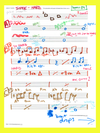Where Do Songs Come From?
Thinking of songwriting as labor versus divine inspiration can be helpful in resisting the endless churn of big streaming.

This short essay went out as part of today's edition of the weekly Hearing Things newsletter, and is also being published here.
I’ve been working on a song this week. Sometimes, they arrive all at once. This one is taking its time. I pick up the guitar for 10 minutes between finishing lunch and getting back to work, or for an hour in the morning before the day’s obligations start calling. I have a good melody and an opening line that might lead somewhere interesting. That’s where things have stood, more or less still, for the last few days. For now, working on the song means playing and singing the first line over and over in those small moments, waiting for it to show me what’s next. Here and there I might adjust a note or two, erasing one contour of the tune and penciling in another. Then I go back to singing and waiting.
I like asking other songwriters about their processes when I interview them. Some people have stories like mine, or detailed theories about their own tendencies and preoccupations. Others say they just start playing and something comes out. Some take it even further, nearly denying responsibility for their own work, claiming that some outside force was speaking through them. I don’t always believe the people in the second and third camps. But I don’t think there’s much correlation between an ability to articulate your songwriting process in a compelling way and an ability to write a compelling song. It’s hard to imagine any members of the Ramones waxing eloquently about the composition of “I Wanna Be Sedated.” A conservatory-trained virtuoso could lecture all they want about harmonic substitutions and still never come up with anything that good.
There’s something intoxicating, and not entirely untrue, about the notion of pure, ineffable, quasi-divine inspiration as one of songwriting’s primary engines. Picture the act of creation in other art forms and you may see long hours of skilled and difficult labor: the novelist hunched over manuscript edits until the wee hours; the filmmaker choreographing a small army of actors and camera operators, presiding over every aspect of their directorial vision. Picture a song coming together and you may see a rock band bashing it out with a couple of beers vibrating precariously atop guitar amps behind them, rendering their hopes and frustrations as an inarticulate squall. Or a rapper freestyling in the booth, spinning catchphrases and imagery out of whatever comes to mind. It really does seem more likely to simply catch lightning in a bottle in music than in fiction writing or filmmaking. We have a whole cultural shorthand for musicians who manage it once and never again: You don’t hear about quite as many one-hit-wonder novelists.
The perception of music as emanating through its chosen vessels from some secret other world may help to bolster its particular claims on our imagination: the way it can feel almost magical, and make other pursuits seem pedestrian by comparison. Lately I’ve wondered whether this perception also contributes, in some small way, to music’s treatment as essentially valueless by contemporary society. Of course, there are much greater forces at play than this one. (Read Liz Pelly’s great recent book Mood Machine to get a sense of them.) But is it so farfetched to believe that this artform, whose own practitioners sometimes claim arises through a combination of intuition and mystical channeling, is uniquely fucked under 21st century capitalism in part because it doesn’t seem like hard work?
Music’s aura of magic, in terms of its effects on listeners—the way so many of us talk about needing certain songs as companions for daily hardship and celebration, how they can begin to feel like extensions of our own hearts and minds—may also contribute in a twisted way to this devaluation. It reminds me a little of the pandemic-era healthcare workers who rejected the mantle of heroism for simply doing their jobs. Heroes get teary eyes and fond thoughts. Workers get paid. That’s one of the reasons why I like talking to musicians about process. Not only is it illuminating on the level of craft; it also feels as urgently political, to me, as talking to them about industry economics, for the way it centers the labor of music-making.
Still, I am not immune to the magical view. When I’m sitting there singing that first line of my song-in-progress over and over, it can feel a little like waiting for divine inspiration. When that next line finally comes, it may well be impossible to explain. But I think it’s important to remember the work too: the fiddling with chords, the erasing and penciling in.
For some people, thinking about music in this way might rob it of its power. For me, the human effort and ingenuity involved is the power’s very source. When I’m feeling disconnected from and unmoved by music, it’s usually because the endless stream creates the impression that songs might have sprung from the stream itself, interchangeable bits of content without creators, a sort of perversion of the magical view, with its channeling and inspiration. Whenever this happens, I find it helpful to listen closely and remember: Someone made this.





